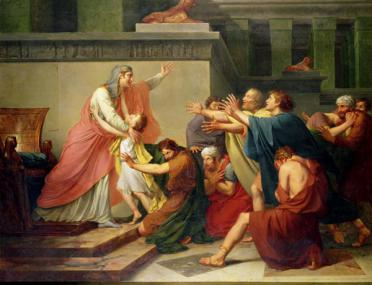Every week, parshaoftheweek.com brings you a rich selection of material on parshat hashavua, the weekly portion traditionally read in synagogues all over the world. Using both classic and contemporary material, we take a look at these portions in a fresh way, relating them to both ancient Jewish concerns as well as cutting-edge modern issues and topics. We also bring you material on the Jewish holidays, as well as insights into life cycle rituals and events...
The Parsha of Miketz is almost always read on the Shabbat of Hanukkah. One of the obvious connections between this parsha and the holiday, albeit a complicated one, is the theme of Jews living in a non-Jewish culture. Miketz is all about how Yosef managed to live in the land of Egypt and, in fact, master the country and its culture, becoming, by the age of thirty, Pharaoh’s right-hand-man, and actually running the state. This successful assimilation into Egypt is underscored by what seems to be Yosef’s ultimate goal, once his brothers come from Canaan and he meets them. He hides his true identity from them, and tries his best to separate his brother Binyamin from the rest of them (who are only his half brothers, as they have different mothers) and arrange for him to remain alone with him in Egypt. All of his machinations throughout parshat Miketz are aimed at keeping his brother in Egypt and sending the rest back home. Yosef seems to plan to remain in Egypt with his brother Binyamin forever.
This certainly seems to clash with the struggle of civilizations which we understand Hanukkah to be all about: the Jewish people’s refusal to become culturally Greek. How are we meant to understand Yosef’s apparent willingness to become an Egyptian? Is it really possible that he intended to leave the land of Israel and his family behind, and live, with his beloved brother, the life of an Egyptian big shot?
The question as to what Yosef’s ultimate goal was in separating Binyamin from the other brothers – achieved by first forcing the brothers, who had initially come to purchase food without Binyamin, to bring him down to Egypt, and then planting the royal goblet on Binyamin, and accusing him of stealing it, so that he could keep him there, ostensibly as a slave, and send the rest home – is one that many have tried to answer. It remains unclear what his real intentions were. What is clear is that once Yosef makes the dramatic move to keep Binyamin with him, and, in next week’s parsha, Vayigash, Yehuda steps up and argues for his brother’s freedom, offering himself as a slave instead, we are told that “Yosef was not able to restrain himself, in the presence of all those who stood before him… and he called out tearfully, and Egypt heard, and the House of Pharaoh heard. And Yosef said to his brothers, ‘I am Yosef. Is my father still alive?’”
Clearly, all the lies and pretence, the hiding of his identity, and the complicated attempt to get Binyamin to Egypt and keep him there, alone, all come to an end because of an emotional moment, a moment that sheds light on what was motivating Yosef all this time to deceive his brothers and, through them, his father. It is only when Yehuda makes up for the callous disregard that he and the other brothers showed for Yosef by first planning to kill him, and then ultimately selling him as a slave, by stepping up to save Yosef’s younger brother, Binyamin, that Yosef is forced to stop the charade and announce that he is, in fact, Yosef, one of them, a son of Yaakov, and not an Egyptian.
It would seem that the simplest and most likely explanation for Yosef’s behavior is personal: he was profoundly hurt, and angered, by what his brothers had done to him. His intention to separate Binyamin from them and make a life with him in Egypt was not really connected to Jewish destiny or a covenant with God; he was not thinking about the promise God made to his father, grandfather, and great-grandfather to give them the land of Israel – it was all just personal. His quite understandable anger towards his brothers led him to leave behind his identity, an identity that he could no longer embrace or feel comfortable with, and seek a new one. That is why he sought to break with his brothers, and make a new life with his innocent, beloved brother Binyamin, in Egypt. Only once this very personal issue was addressed, by Yehuda dramatically coming forward, like a brother, and offering to save Binyamin by becoming a slave himself, is Yosef able to get over the anger and the hurt, and embrace, once again, the identity of brother and son to the family of Israel.
Identity begins at home. We see ourselves as Jews by seeing ourselves as brothers, sons, and daughters of the Jewish people. If, tragically, the relationship with our Jewish family is shattered, as it was by the horrible behavior of Yosef’s brothers, initiated by Yaakov’s very poor parenting – the obvious favoritism he showed to Yosef - then our entire identity as Jews is challenged. It is not surprising, therefore, that the holiday of Hanukkah, which is all about our fight to maintain our Jewish identities in the face of the overpowering Greek world, is celebrated in the home. As the Talmud puts it: נר, איש, וביתו – Hanukkah is all about the candle, the person, and the home. We know that it is in the home, with the people in it, that our identities as people, and as Jews begins or, sadly, if things go horribly wrong, sometimes ends.
Happy Hanukkah and Shabbat Shalom,
Rabbi Shimon Felix



Get inspired by Miketz Divrei Torah from previous years